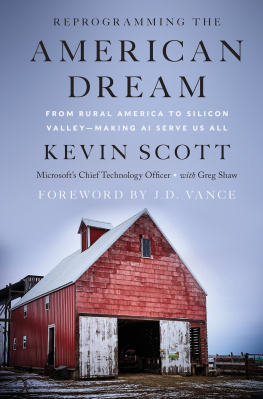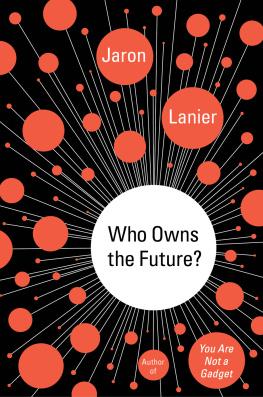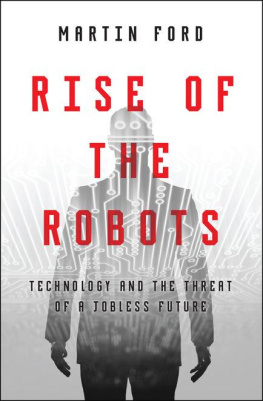Contents
For my dad, Jimmie Scott, and my kids, Chloe and Connor
A couple of years ago, I found myself on the phone with Microsoft Chief Technology Officer (CTO) Kevin Scott. Calls like this happen from time to time: I am in the business of investing in technology companies, and when an important leader of one of the most important technology companies wants to give you a call, you answer.
I didnt realize at the time that Kevin and I came from similar backgrounds. He grew up poor, in a family living on the outskirts of rural Appalachia, and though our stories differed in important ways, I felt like I was talking to a kindred spirit. I spend so much of my life around people who dont understand my background that it was easy to talk to someone whose life bore so much resemblance to my own. We spoke about what he was seeing in his work with Microsoft, what types of companies I had invested in, and my book, Hillbilly Elegy. He also asked me about writing a book, something he had apparently thought about doing for some time. So I gave him my views on writing a book while having a full-time job, the upsides and the downsides. The advice was probably uselessworth about what Kevin paid for itbut we promised to stay in touch, and then I hung up the phone.
In the coming months, Id invite Kevin to accompany my team during some of our investing work, and he graciously agreed. I knew that he continued to work on his book, and eventually I got an email from Kevin with a long Word file. Apparently, Kevin had worked on his book in earnest, and the pages you hold in your hands are the fruit of that labor.
Reprogramming the American Dream is a hybrid of a book. In it, you learn a bit about Kevins background: where he came from, what his parents did, and how he struggled (and didnt). You learn a bit about his values, and what motivates him. Hes never quite gotten over his home in rural Virginia. He still loves it and regrets just a little the fact that he was eventually forced to leave. Thats a tension I know well. But it also has some interesting ideas. The core thesis of the book is that AIartificial intelligenceis coming, and we need to do something about it. We need to understand ithow it will affect our future, what it will require of our educational institutions, and what it will do to our jobs.
I first became interested in AI through my work as an investor. I didnt originally think much about its effect on jobs. In my life as an investor, Im paid, at a fundamental level, to see things before other people see them. And I became mildly obsessed with the fact that no one spoke about AI as a military technology. Most new technology, after all, has a military application, and there were some obvious ways in which Americas global competition recognized the military use of AI. But among many of the technology entrepreneurs I spoke to, they focused on any number of AI applicationsdrug discovery, early cancer detection, autonomous vehicles, lighting for agriculture, and on and on.
But if you spend enough time reading about AI, for whatever reason, youll eventually stumble onto a conversation about its effect on jobs. Before too long, I had uncritically accepted the conventional wisdom that automation would lead to a jobs Armageddon, where low- and middle-skilled workers would lose their ability to make a living. But its not totally clear thats true. To take just one obvious example from recent history: the advent of automated teller machinesATMsmight have been expected to eliminate all the human tellers. Instead, ATMs reduced the cost of running a brick-and-mortar bank, it freed up human tellers to do other things, and today there are more tellers employed than when the ATM was invented.
This book is such a critical contribution to the conversation because it pushes back against the conventional wisdom. Sometimes AI will destroy jobs, yes, but technology is a core part of how our society improves itself. Diseases are cured and people made healthier through the process of doing things we couldnt do beforein other words, through technology. Technology is hardly the only important part of a growing and vibrant society, but without real technological innovation, its hard to achieve rising living standards. One of my favorite parts of this book is where Kevin gets a little technical on AI. Kevin knows his stuff and respects his readers enough to not talk down to them. You wont become an AI expert from one book, but youll gain some passing knowledge of the issues at hand.
I confess to being skeptical that much of what passes for technology is inherently either good or bad. Much of it depends on how we use it. The iPhone is unquestionably a significant technological innovation. Some people use it to post hateful memes on Twitter; others use it to speak to and see their children half a world away. Some of our countrys neuroscientists are working to create technology to cure dementia; others to addict our kids to gambling applications.
Even if you dont think innovation is always good, and I obviously dont, the change that it brings is an inexorable part of our lives. If Kevin is right, and AI is among the most important technologies of our generation, some people will do very good things with it and some will do very bad things with it. But the easy, and conventional, approach of seeing AI as something that destroys jobs misses more subtle and interesting questions about how we turn AI to useful purposes, how we prepare our workforce for some of the new jobs that will come, and how we protect our communities in the face of disruption that often accompanies dynamism.
Kevin and I agree on a lot, but not on everything. Im somewhat more skeptical that a fully human style AI (called artificial general intelligence) is around the corner. He seems pretty skeptical of universal basic income (UBI). I am even more skeptical than Kevin.
There is a laziness at the heart of too much discourse, and it is perhaps Kevins greatest strength in this book that he avoids it. It is the laziness of assuming that historical and economic trends are entirely immune to our choices. AI may be coming, but how we respond to it, and the effects we facegood and badrequire deliberate, thoughtful action. You may not agree with everything he says, but I hope you, like me, appreciate that Kevin finds some balance between the poles of the robots are coming for our jobs! and AI is great, nothing to worry about! I suspect that, in the coming decades, well increasingly recognize the wisdom of that view.
J.D. Vance
Ive always had a thing for stories. It might be a Southern thing. A rural thing. I grew up surrounded by a lively cast of characters with a flair for narrative and sometimes improbable adventures. Every Sunday morning, I got a two-hour dose of the King James Bible through the lens of fire-and-brimstone preaching. When my mom tired of reading me the same stories over and over, I taught myself to read and begged for trips to the library to keep me flush with new material. History. Greek mythology. Dr. Strange and the Doom Patrol. The World Book Encyclopedia. National Geographic. The Peterson Field Guide to the Stars and Planets. I could not get enough stories.
Turns out that storytelling is not just a Southern or a rural thing. Its also a tech thing. In TheWritten World, an inspiring treatise on the power of stories to shape people, history, and civilization, Martin Puchner writes that in order to tell the story of literature he had to focus on both storytelling and creative technologies because their intersection is the starting point. The alphabet is code; paper and the printing press are technologies for communications, just as computer languages are code, and the Internet communicates. Yuval Noah Harari, in his book




